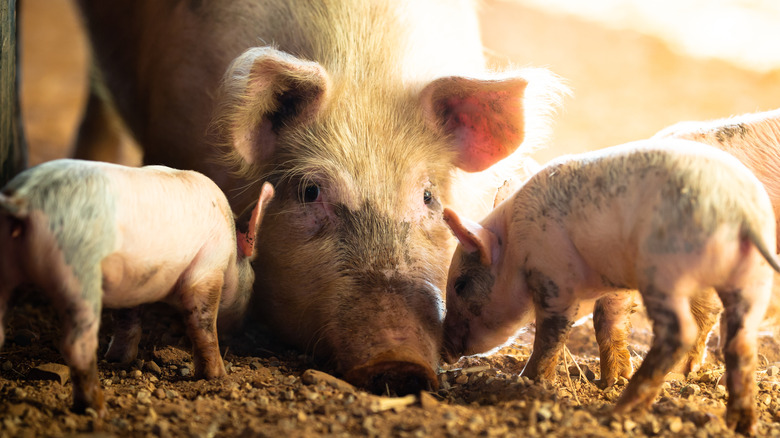The Supreme Court Will Decide On California's Pork Ban. Here's Why
That bacon arriving with breakfast or the pork roast served at dinner might come with a side conversation about the highest court in the nation. While people can have various food debates, the U.S. Supreme Court will listen to arguments regarding the legal challenge to California's Proposition 12. As reported by NBC News, pork producers are asserting that the legal requirement on pig housing dimensions seeks to regulate "wholly out-of-state commerce" which is not constitutional.
"It requires massive and costly alteration to existing sow housing nationwide, necessitates either reduction of herd sizes or building of new facilities to meet its space mandates, raises prices in transactions with no California connection, drives farms out of business, and promotes industry consolidation, and will be policed by intrusive inspections of out-of-state farms conducted by California's agents," they explained in an appeal.
While the California initiative sought to improve inhumane housing conditions for animals that are used for consumption, the impact of that mandate reaches far greater than the confines of the animal's stall. Although many people can empathize with the underlying issue that Proposition 12 sought to address, the legal implications of this act reach beyond the California borders. Specifically, this example is where one state looks to impose its regulations on aspects of interstate commerce. That scenario conflicts with the Interstate Commerce Act, which gives Congress, not the states, the authority to regulate in that area.
Why consumers should care about California's pork ban
While the Supreme Court has been front page news recently, adding the hearing on California's pork ban to the docket barely got a snort from those outside of the food world. But the impact of Proposition 12, as well as the potential ripple effect on other food segments is a topic that needs further discussion. When one state seeks to regulate the businesses in other states, the issue becomes a discussion impacting the whole nation.
As the New York Times reported, the opposing sides on California's initiative to eliminate the use of pork housed in 24-square-foot spaces or smaller are very divided. While there is an argument for humane treatment of animals, the far reach into the pocketbooks of both companies and consumers needs to be weighed. Although some people might not be well versed in the intricacies of Constitutional Interstate Commerce Law, the reality is that consumers can easily appreciate higher food costs. Far beyond the conversations of inflation and food shortages of 2022, the free flow of commerce without regulatory impediments is part of the American way.
Whether or not the nation's highest court upholds California's Proposition 12 remains to be seen. No matter the final outcome, "bringing home the bacon" will have a new meaning on the family dinner table.

